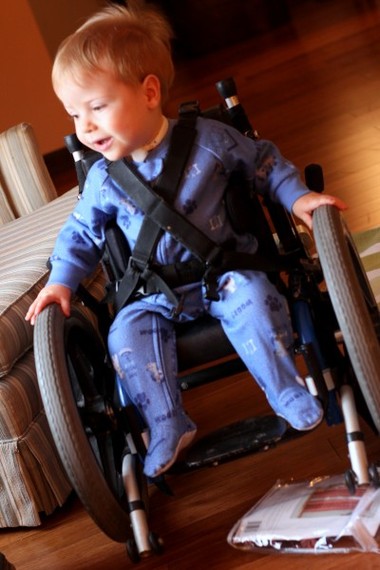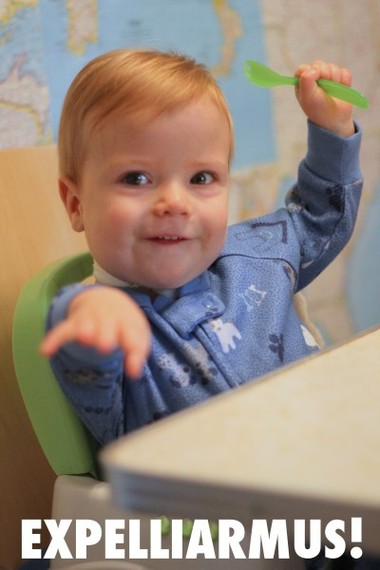When my son was a baby, I took him to our local toy store. The place was almost empty, but as we rounded the corner, we bumped into a woman and her husband. They leaned over and looked at my son as we passed. He giggled. They waved. They said how cute he was. It was nice.
But near the end of the aisle, we passed the woman's son -- an 8-year-old boy. The kid glanced over at my stroller and I saw a look of confusion flit across his face. His jaw dropped. He looked perplexed and the slightest bit nervous. He called to his mother standing a few feet away, pointed at my son and said with curiosity, "What IS that?"
Because my son has spina bifida and, at the time, he breathed with the help of a trach (which, if you're not used to seeing it, can be a bit surprising).
I looked behind me and watched his mother's eyes widen with embarrassment as her face turned stop sign red. She glared at her son, took him by the arm and mouthed angrily into his ear: "Don't. Say. Anything."
And I felt terrible -- like my little boy was shameful somehow. Because he has a disability, and disabilities should not be spoken of.
Kind of like Voldemort.
Can we talk about Voldemort for a second? He is one bad dude. He's so freaking scary that if you even speak his name, all manner of horrors could rain down upon you. The kids at Hogwarts knew better than to mess with that can of worms (except for Harry Potter, since he's brave and also a hero, no biggie) because, just like we teach our kids in the real world, it's best not to talk about bad things.
Bad things should be kept quiet.
But disability isn't bad. And I'm sure that the woman at the store didn't think my son was a menace of Voldemort proportions. Still, pointing out our differences makes us uncomfortable. We don't know what we're allowed or not allowed to say about disability. So we prefer to say nothing.
The problem is that our children are still learning the rules. They see difference in the world and they ask questions. They see difference and they speak it. They see difference and they point their fingers. All we can do is react.
And our reactions send a message to our children. Our reactions tell them how to feel about the differences they see.
Would we reprimand our child for pointing out a woman who has blonde hair instead of brown? Probably not. Because it's OK to have blonde hair. So what are we telling our kids when we reprimand them for pointing out a person in a wheelchair or a person who is blind? We have to help our children to be comfortable with differences. We can't treat disability like Voldemort.
Here's my advice:
If your child is the finger pointer:
- Stay calm. I know it's embarrassing. I know it's awkward. But seeing you stressed over the mention of someone's disability will make your child feel that they've done something bad by bringing it up. Know that it's normal for kids to ask questions or even point and stare a bit. Parents like me are used to it.
- Be open to discussion. No need to shush or remove your child from the situation. Try to calmly answer their questions and remember that "I don't know" is an acceptable answer. When the boy at the toy store asked his mother what was going on with my son, I wish she would have felt comfortable saying, "Would you mind if my son asked you a question about your baby?" Like all parents, people who have children with special needs like talking about their kids, and most of us enjoy raising awareness too.
- Lead by example. Do your best to use positive language when talking to your kids about differences -- and not just disability. Try to avoid words that imply disability is sad or bad like "poor thing" or "something is wrong with him." If your child says something hurtful like, "That person is funny looking," you can talk to them about using polite words when they see someone who is different.
If your child is being pointed at:
- Stay calm. Remember that your reaction sends a message too. Little good will come from lashing out or reprimanding a stranger's child. The last thing we want is for children to stay away from our kids for fear of saying or doing the wrong thing.
- Be open to discussion. Answer questions if you feel comfortable. If not, redirect the conversation to what your children might have in common: Do you like video games? Daniel Tiger? My son does too!
- Consider the intentions more than the words. Most of us have been in the special needs community long enough to know what words are OK and what words not OK to use when discussing disability. Remember that most people do not live in the same world of disability parenting, but their intentions are good. Try to remember what YOU were like before your child was diagnosed. Try to remember how long it took you to learn and adjust. Try to assume good intentions. I dislike when someone asks "What's wrong with your son?" or calls him a "poor thing," but shutting them down will only end what could have been an eye-opening conversation.
Above all, remember that we're in this together. Whether your child has a disability or your child does not, we've got to give each other some grace, take a deep breath and let go of our fears.
Be brave. Be a hero.
What would Harry Potter do?
This post first appeared on What Do You Do, Dear?

